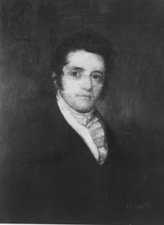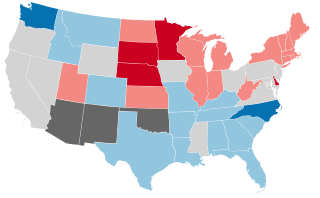| |||||||||||||||||
| |||||||||||||||||
| |||||||||||||||||
The 1829 Alabama gubernatorial election was an uncontested election held on August 3, 1829, to elect the governor of Alabama. Jacksonian candidate Gabriel Moore ran unopposed and so won 100% of the vote.
| |||||||||||||||||
| |||||||||||||||||
| |||||||||||||||||
| Elections in Alabama |
|---|
 |
The 1829 Alabama gubernatorial election was an uncontested election held on August 3, 1829, to elect the governor of Alabama. Jacksonian candidate Gabriel Moore ran unopposed and so won 100% of the vote.
| Party | Candidate | Votes | % | ±% | |
|---|---|---|---|---|---|
| Jacksonian | Gabriel Moore | 10,956 | 100% | ||
| Majority | 10,956 | 100% | |||
Samuel B. Moore was the sixth Governor of the U.S. state of Alabama from March 3 to November 26, 1831. He was president of the Alabama Senate when Governor Gabriel Moore was elected to the United States Senate, and so became governor when Gabriel Moore resigned to take the seat.

Gabriel Moore was a Democratic-Republican, later Jacksonian and National Republican politician and fifth governor of the U.S. state of Alabama (1829–1831).

John Malcolm Patterson was an American politician. He served one term as Attorney General of Alabama from 1955 to 1959, and, at age 37, served one term as the 44th Governor of Alabama from 1959 to 1963.

The 1828–29 United States House of Representatives elections were held on various dates in various states between July 9, 1828, and October 5, 1829. Each state set its own date for its elections to the House of Representatives before the first session of the 21st United States Congress convened on December 7, 1829. Elections were held for all 213 seats, representing 24 states.
Events from the year 1829 in the United States.

Roy Stewart Moore is an American politician, lawyer, and jurist who served as chief justice of the Supreme Court of Alabama from 2001 to 2003 and again from 2013 to 2017, each time being removed from office for judicial misconduct by the Alabama Court of the Judiciary. He was the Republican Party nominee in the 2017 U.S. Senate special election in Alabama to fill the seat vacated by Jeff Sessions, but was accused by several women of sexually assaulting them while they were underage and lost to Democratic candidate Doug Jones. Moore ran for the same Senate seat again in 2020 and lost the Republican primary.

Kay Ellen Ivey is an American politician who is the 54th governor of Alabama, serving since 2017. Originally a conservative Southern Democrat, Ivey became a member of the Republican Party in 2002. She was the 38th Alabama state treasurer from 2003 to 2011 and the 30th lieutenant governor of Alabama from 2011 to 2017.

The 2010 Alabama gubernatorial election took place on November 2, 2010. Incumbent Governor Bob Riley was term-limited and unable to seek re-election. The party primaries were held on June 1, 2010, with a Republican runoff on July 13. In the general election, Robert J. Bentley defeated Democrat Ron Sparks. This was the first election in which Republicans won three consecutive gubernatorial elections in the state. This was also the first time since Reconstruction that a Republican carried Colbert County, Franklin County, and Lawrence County in a gubernatorial race.

The 2020 United States Senate election in Alabama was held on November 3, 2020, to elect a member of the United States Senate to represent the State of Alabama, concurrently with the 2020 U.S. presidential election, as well as other elections to the United States Senate in other states, elections to the United States House of Representatives, and various state and local elections.

The 2017 United States Senate special election in Alabama took place on December 12, 2017, in order for the winner to serve the remainder of the U.S. Senate term ending on January 3, 2021. A vacancy arose from Senator Jeff Sessions's February 8, 2017, resignation from the Senate. Sessions resigned his post to serve as the 84th U.S. attorney general. On February 9, 2017, Governor Robert J. Bentley appointed Luther Strange, the attorney general of Alabama, to fill the vacancy until a special election could take place. The special election was scheduled for December 12, 2017.

The 1825 Alabama gubernatorial election was an uncontested election held on August 1, 1825, to elect the governor of Alabama. Jacksonian candidate John Murphy ran unopposed and so won 100% of the vote.

The 1827 Alabama gubernatorial election was an uncontested election held on August 6, 1827, to elect the governor of Alabama. Jacksonian candidate John Murphy ran unopposed and won 99.25% of the vote. Various write-in candidates made up the other 0.75%.

The 1831 Alabama gubernatorial election was an election held on August 1, 1831, to elect the governor of Alabama. Jacksonian candidate John Gayle beat the incumbent Jacksonian governor Samuel B. Moore and National Republican candidate Nicholas Davis with 55.01% of the vote.

The 1833 Alabama gubernatorial election was an uncontested election held on August 5, 1833, to elect the governor of Alabama. Democratic candidate John Gayle stood unopposed and so was elected with 100% of the vote.

The 1837 Alabama gubernatorial election was an election held on August 7, 1837, to elect the governor of Alabama. Democratic candidate Arthur P. Bagby beat Anti-Van Buren candidate Samuel W. Oliver with 45.21% of the vote.

The 1839 Alabama gubernatorial election was an election held on August 3, 1839, to elect the Governor of Alabama. Incumbent Governor Arthur P. Bagby defeated Whig Party candidate Arthur F. Hopkins with 92.29% of the vote.

United States gubernatorial elections were held in 1900, in 34 states, concurrent with the House, Senate elections and presidential election, on November 6, 1900.

The 1829 Rhode Island gubernatorial election was an uncontested election held on April 15, 1829 to elect the governor of Rhode Island. James Fenner, the incumbent governor and Jacksonian Party nominee, was the only candidate and so won with 100% of the vote.

United States gubernatorial elections were held in 1894, in 28 states, concurrent with the House and Senate elections, on November 6, 1894.